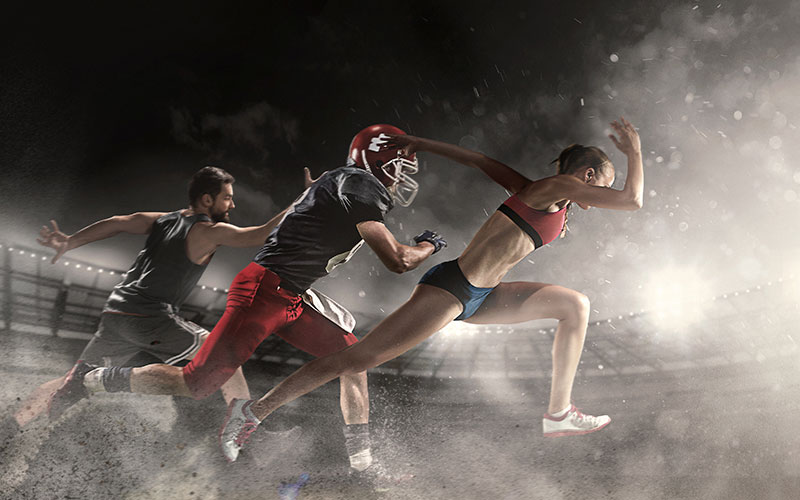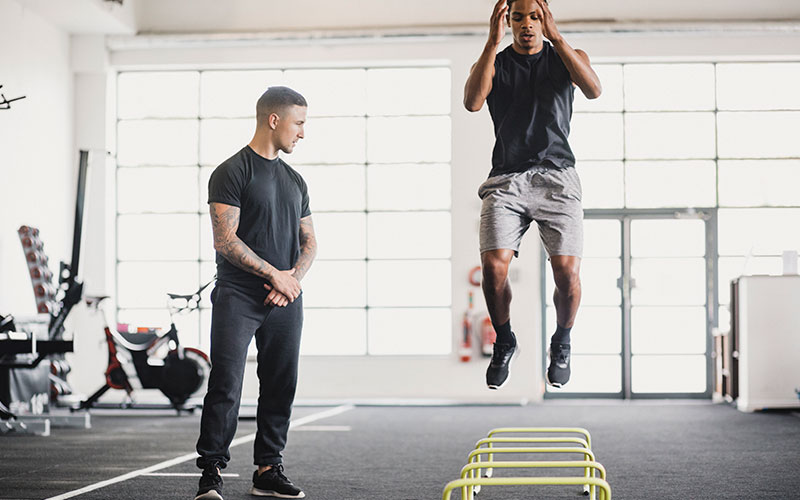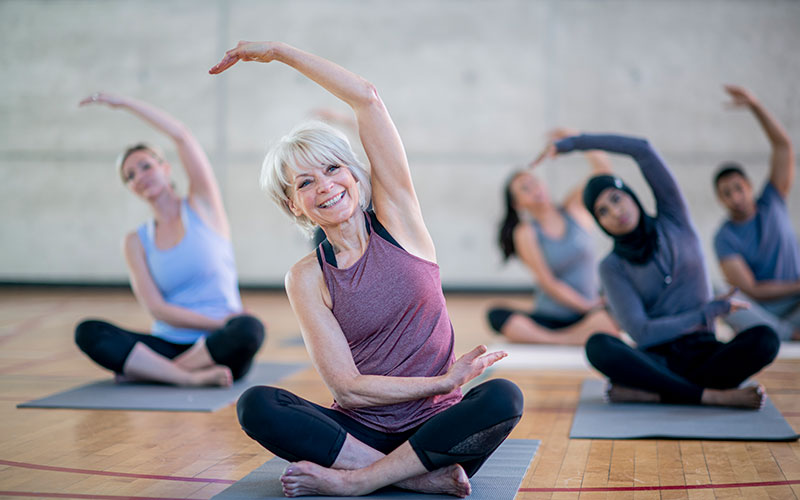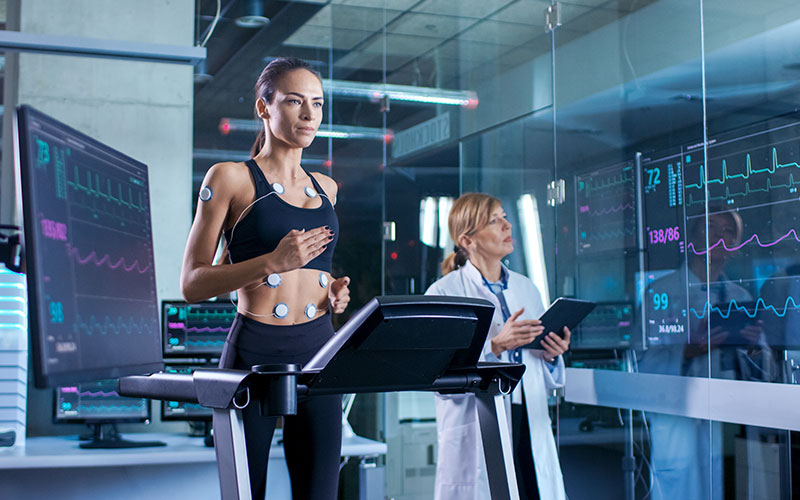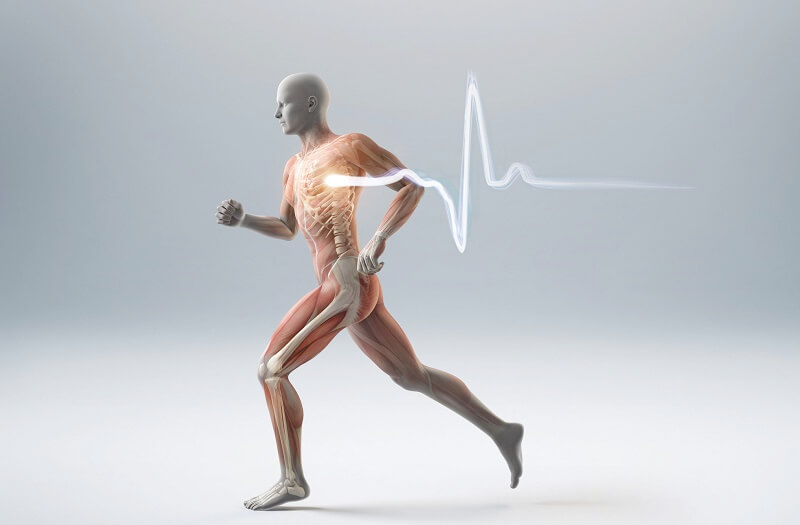- Home
- Growth Hormone
- Growth Hormone
- Growth Hormone Deficiency
- Growth Hormone Therapy
- Growth Hormone Injections
get startedThe Most Effective Hormone Replacement TherapiesTestosterone, HGH and Athletic Performance
Testosterone and HGH both have properties that can improve strength, stamina, and endurance, and therefore can enhance athletic performance.
Testosterone and HGH can improve athletic performance. They are different types of hormones, but both have an “anabolic” effect. While in sports, “anabolic” seems to have a negative connotation, physiologically, the word literally means “to build up.” Therefore, both testosterone and HGH have “anabolic” properties in that they are both critical in building lean muscle.
There is no question that HGH and testosterone can and do improve athletic performance. Because of this, both substances are banned in most professional and Olympic competitions. However, if they are legally prescribed to you for low testosterone or age-related HGH depletion, one of the benefits you will see is improved results in any kind of personal sports you do.
Can I Use HGH or Testosterone to Improve Sports Results?
Professional athletes cannot use HGH nor testosterone to up their games, as it will give them an unfair advantage over the competition. You, however, are not under any such restrictions. As long as you have been diagnosed with low testosterone or age-related HGH deficiency and have been given a legal prescription for either HGH or testosterone, one of the benefits you will see from hormone replacement is improved ability in any personal sport that you are into.
If you go to the gym, you will notice that you are getting more out of each workout; if you play on a weekend softball team, you will be able to run faster and hit the ball further. Whatever recreational sport you may enjoy doing – running, tennis, swimming, biking, or even walking or hiking – you will get better at it once you are on hormone replacement therapy.
Any physical trainer will tell you, building lean muscle and burning fat is the main goal of any fitness program or regimen. Once you burn fat and build muscle, you boost your metabolism and are well on your way to improved health, strength, and longevity. In other words — your "peak performance."
HGH and testosterone help you to build muscle when you work out and burn more fat. Beyond that, many of the problems we think of as “growing old,” such as fatigue, lack of energy, loss of sexual drive, and memory issues, are all related to declining levels of HGH and testosterone as you age.
In addition to improved sports performance, growth hormone or testosterone therapy, when legally prescribed, helps our patients feel younger, stronger, and more vital. Hormone replacement therapy can:
- Help you build muscle and burn fat
- Improve your vitality and energy levels
- Improve sleep
- Improve cognition and memory
- Improve libido or sex drive
- Improve mood
- Improve hair and skin health
- Improve bone health
- Provide an increased sense of overall strength and well-being
Testosterone and Sports Performance Enhancement
There is no doubt whatsoever that testosterone can improve your ability at sports and athletic activities. Testosterone definitely has a beneficial impact on muscle mass. You cannot increase muscle mass without testosterone. Testosterone is an anabolic steroid. In medical terms, anything that has an "anabolic" effect means that it enhances protein synthesis and promotes the building of muscle tissue.
As men age, testosterone levels drop. As you lose testosterone, your ability to build lean muscle decreases. This is why men with low testosterone often gain weight and find it difficult to build lean muscle, even while working out. By returning your testosterone levels to normal through the use of prescription testosterone injections, your ability to build muscle increases, as will your performance in sports.
HGH and Sports Performance Enhancement
Like testosterone, HGH also has a positive impact on muscle growth. Due to its known anabolic properties, it is widely accepted by the medical community that HGH enhances muscle performance in sports and can improve muscle function in the elderly or in adults suffering from age-related growth hormone depletion.
HGH increases muscle strength by enhancing muscle mass. HGH also stimulates whole-body protein synthesis, providing the energy required to power muscle function.
HGH also plays an important role in metabolism because it increases lean body mass and promotes more efficient burning of fats. This is why HGH is used for athletic improvement, advanced healing of sports injuries, and to treat musculoskeletal conditions, as well as the muscle weakness that occurs due to growth hormone deficiencies.
Are Testosterone and HGH Banned in Professional Sports?
Testosterone and similar anabolic steroids enhance athletic performance in both men and women. As a result, in the athletic world, "doping," with either or both hormones, is banned from most competitive sports in the US. In 1989 the International Olympic Committee became the first major sports organization to brand human growth hormone, a banned substance. It is also banned by most professional sports leagues in the US.
In 2018 there were some controversial cases involving some high-profile athletes and the use of HGH. The most notable of which was Peyton Manning. Manning has since been cleared of any charges.
Testosterone, like all steroids, has been named a "performance-enhancing drug" and is banned by most major amateur and professional sports organizations. Despite this, being driven by the pressure to succeed, many professional athletes have been caught illicitly using testosterone to boost performance. The use of steroids is particularly dominant in the sports of bodybuilding and pro-wrestling.
It is important to understand, however, that this does not mean HGH or testosterone are in some way “illegal.” As long as they are legitimately prescribed for you by your doctor, for the average person, there is nothing illegal or illicit about using HGH or testosterone.
In fact, the idea that professional sports prohibit the use of HGH and testosterone speaks volumes about what they can do to boost your own personal performance!
There is absolutely no such “ban” on the use of HGH to enhance performance by anyone other than competitive athletes.
Do not let the various sports bans lead you to believe that growth hormone therapy or testosterone therapy is dangerous or unsafe. In fact, just the opposite is true. The main reason the two hormones are barred from professional sports is because of their very real abilities to increase strength, stamina, and endurance.
On the field, HGH or testosterone can give a pro an unfair advantage over his or her competition. But for you, they can give you a much-needed advantage over getting older!
HGH and Testosterone in Recovery From Sport Injuries
HGH may be banned by most major sports organizations, but it may serve a purpose in the sports world. A few years ago, Mark Cuban, the billionaire owner of the Dallas Mavericks, funded a study by the University of Michigan that was looking into how HGH can speed the recovery of ligament tears and other common sports injuries.
Cuban’s foundation put up $800,000 to back the two-year exploratory study. The results of the study were recently released. The study concluded that HGH helped to improve strength and enhance the healing of muscles of the knee in athletes who underwent ACL surgery. The use of HGH helped the athletes to recover quicker and return to the game sooner.
Similarly, testosterone and similar anabolic steroids are being looked at for their apparent ability to aid recovery from sports-related injuries. Animal studies have found that testosterone injections show promise in aiding the healing of bone and muscle damage due to common sports-related injuries.
What Do The Studies Say About HGH and Testosterone in Sports?
All of the studies involving HGH or testosterone and their impact on sports or athletic abilities confirm the known anabolic effect of both hormones and justify their exclusion from competitive sports as performance-enhancing substances. A 2012 study published in the journal Hormones and Behavior on testosterone and sports said, “Testosterone and other anabolic-androgenic steroids enhance athletic performance in men and women. As a result, exogenous androgen is banned from most competitive sports.”
A 2004 study published in Sports Medicine concluded that “Androgenic-anabolic steroids (AAS) [which are] synthetic derivatives of the male hormone testosterone, can exert strong effects on the human body that may be beneficial for athletic performance.”
Several meta-analyses (taking the combined data from several studies) have shown that testosterone therapy increases lean body mass and muscle strength in middle-aged and older men. These analyses also determined that testosterone injections were as much as 3 to 5 times more effective at increasing muscle mass, as opposed to gels and other testosterone therapy preparations.
A 2018 study in the British Journal of Sports Medicine determined that female runners given topical testosterone cream increased their time to exhaustion, one measure of athletic ability.
There have been many similar studies that have proven HGH’s ability to build lean muscle and thereby enhance athletic performance and sports results. A 2010 study published in Annals of Internal Medicine examined the effect of a 2mg dose of HGH on body composition, endurance, strength, power, and sprint capacity.
The study recruited "recreationally active men and women" in randomized control trials. As in many previous studies of the benefits of HGH, the results of this one showed an increase in muscle mass and decreases in fat. But this one specifically looked at any increases in athletic ability. The results showed that HGH did indeed increase “sprint capacity,” as measured in seconds.
A 2009 position paper published by The National Strength and Conditioning Association (NSCA) concluded that "Human growth hormone increases lean body mass within weeks of administration…."
A 2019 study looking at the impact of HGH replacement on muscle strength and tone in older men said that "Our study demonstrated an increase in muscle strength in the lower body part after HGH therapy in healthy men.” The study involved fourteen healthy men aged 50–70 years, whose baseline muscle strength was determined by leg press and bench press exercises, which focus primarily on quadriceps, the lower body part of the body, and pectoralis major—upper body part.
After six months of HGH replacement therapy, the men in the HGH group did not show much difference in upper body strength, as determined by bench presses, but showed “significant” increases in lower body strength as indicted by vast improvements in strength in the leg presses.
Now that you know a little bit more about testosterone, HGH, and athletic performance, why not contact us today, and let’s see how we can help you to the top of your game!
- Growth Hormone Therapy








